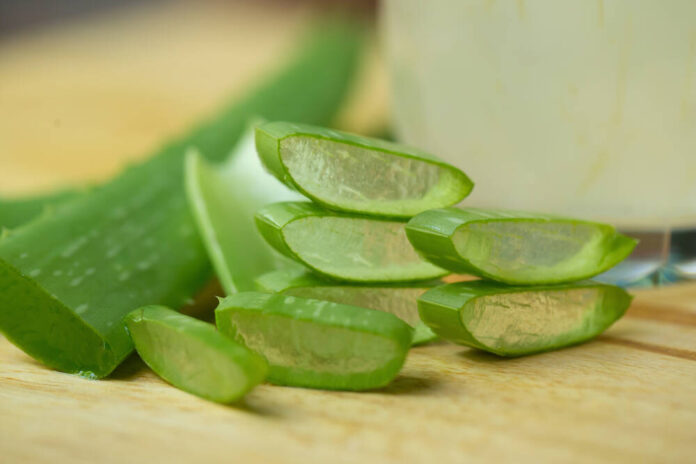
Whether you are 16, 46, or 66, you can develop acne. Among elderly people it’s rare, but for everyone else, the possibility of experiencing this common skin condition is a reality. Lots of suggestions for management and treatment are available, both medicinal and natural, and one of the best among the latter category is aloe vera.
What is aloe vera?
You may be most familiar with aloe vera as a natural remedy for sunburn and minor skin burns, as well as minor cuts and scrapes. Many people like to keep an aloe vera plant in the kitchen or close by to handle such medical issues.
Aloe vera is a succulent plant that grows in tropic, subtropical, and arid areas of the world. It is well known for its anti-inflammatory, antibacterial, and antioxidant properties. In addition to the skin-related conditions already mentions, it is widely used both topically and internally for moisturizing and hydrating the skin, digestive problems, constipation, arthritic swelling, gum infections, and more.
Read about 16 reasons why aloe vera rocks
Aloe vera for acne: topical
The antibacterial, antioxidant, and anti-inflammatory properties of aloe vera gel and cream make them effective tools for fighting acne. You can apply pure aloe vera gel or cream on the skin to help prevent acne breakouts and to help eliminate bacteria that promote the development of more papules. Aloe vera can be applied to existing acne and left on overnight and then washed off with warm water in the morning.
Aloe vera is very mild on the skin and typically poses little to no risk. However, you should always do a small test patch or consult with a dermatologist before applying aloe vera or any other substance for the first time on your face.
You may want to try an aloe vera face mask for acne:
Aloe vera, cinnamon, and honey: All three of these ingredients have antibacterial properties, so combining them may create a potent face mask. To make the mask, combine 2 tablespoons of pure honey and 1 tablespoon of pure aloe vera until it is easy to spread. Add ¼ tablespoon of ground cinnamon and mix well. Apply the mask to your face and allow it to stay on for 5 to 10 minutes. Rinse with warm water thoroughly.
Aloe vera and lemon juice: This combination will both refresh your skin while also cleaning the pores and killing bacteria. Lemon juice has exfoliative properties that can be helpful in fighting acne. For this mask, combine 2 tablespoons of pure aloe vera with ¼ teaspoon of lemon juice. Leave the mixture on your face for 5 to 10 minutes and then rinse it off completely with warm water. Because lemon juice can be irritating, you can reduce the amount of lemon juice if you notice some discomfort.
Aloe vera gel also can help with healing wounds and scars. The vitamins, minerals, enzymes, amino acids, and other antibacterial and anti-inflammatory agents in the gel can increase collagen in the skin, lessen inflammation, promote the skin’s elasticity, and heal wounds. Experts have found that aloe vera can help treat wounds, prevent skin ulcers, and retain skin moisture and integrity.
Several new studies have looked at using aloe vera in addition to other methods to treat acne. A 2021 study explored the use of topical aloe vera gel and soft mask along with ultrasound, which enhances the absorption of aloe vera gel. The participants had mild to severe acne and were divided into two groups: treatment and controls. Individuals in the treatment group experienced a significant reduction in the number of acne papules and hyperpigmented lesions as well as showed an improvement in skin roughness and facial blood circulation. Participants in the control group did not show these benefits.
A more recent study (2023) used a combination of aloe vera (Aloe barbadensis) and mung beans (Vigna radiata) to treat acne. The author reported that the mixture showed “a promising effect on acne together with an additive effect of Aloe barbadensis on skin.”
Read about 9 reasons to use aloe vera juice every day
Aloe vera for acne: internal
You can also help protect your skin against acne by taking aloe vera juice. This slightly gooey liquid contains polyphenols, which have antioxidant properties that can help support immune function and enhance gut health and in turn may contribute to skin health. Divya Jacob, Pharm.D. notes that drinking aloe vera juice can help reduce the frequency and severity of acne.
One study, for example, found that components of aloe vera juice can help stimulate the production of collagen and hyaluronic acid and thus support skin health. Use aloe vera juice according to package directions or consult with a knowledgeable healthcare professional.
Bottom line
Aloe vera used either topically or internally can benefit skin health and help manage acne. Before consuming aloe vera juice, talk to your doctor if you have any health conditions such as heart disease, diabetes, kidney disease, hepatitis, or other health concerns.
[Editor's Note: Lily of the Desert is a quality brand of aloe vera, grown in the US. You can check out their online store or find their products at your local health food store.]





